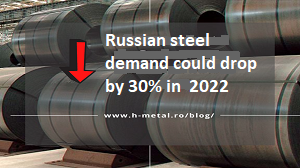Russian steel demand could drop by 30% in 2022
In particular, the demand for steel is dramatically reduced because eight of the 14 Russian car factories have suspended their activities, and the decline of the car industry could be 50%.
Russia is one of the largest exporters of steel in the world. Following the war in Ukraine, the European Union dealt a new blow to the Russian economy by banning imports of Russian steel.

The ban applies to hot and cold rolled steel, pipes, reinforcing bars and other finished products.
The demand for steel is reduced – steel imports from Russia are prohibited
It is estimated that the ban on steel imports from Russia will affect products worth 3.3 billion euros ($3.6 billion).
„It is an industry that has been very active in the field of trade policy.” Said Lydia Cox, who studies international trade and macroeconomics at Harvard.
According to her, the ban on Russian steel includes an increase in the amount of steel. Which EU members are allowed to import from other countries. This means finding new suppliers, but not necessarily reducing the amount of steel it imports.
Europe’s refusal to buy Russian rolled steel forces Russian factories to redirect supplies to China and Asia. But it is unlikely that this move will provide material economic benefits.
The prices of hot rolled rolls in China were already significantly lower than in Europe. Which suggests that Russian companies may have to offer discounts to gain access to the Chinese market.
Also, the higher transport costs associated with the transfer of volumes from Europe to Asia, represent a real problem. A distance of 5,360 km between Moscow and a destination in China, in comparison with 1,860 km to Germany, inevitably generates additional transport costs.
Volumes redirected to Asia would put more strain on the already overburdened eastern network of the Russian Railways. Being made up of the main lines Baikal-Amur and Transsiberian.
Steel imports from Belarus will be banned
The EU bloc also imposed a ban on steel imports from Belarus and, to avoid a supply shortage, will redistribute quotas previously allocated to Russia and Belarus.
In the meantime, Turkey could benefit from this ban. Turkish exporters see $1 billion boost as EU bans Russian steel.
„Turkey’s quota for this year was about 6.2 million tons. The reallocation of quotas means approximately 1 million additional tons for Turkish steel,” said Ugur Dalbeler, vice president of Colakoglu Metalurji, an important Turkish steel exporter.
<< Inapoi